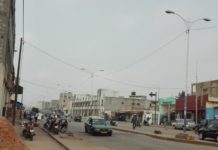by Valentino De Bernardis –
![]() Abiy Ahmed Ali, new leader of the Revolutionary Democratic Front of the Ethiopian People (EPRDF), has sworn as Prime Minister in Addis Ababa. Thus ended a month and a half of political deadlock, characterized by a heated debate inside and outside the ruling coalition, and by the adoption of the umpteenth state of emergency, followed by the resignation of Haile Mariam Desalegn.
Abiy Ahmed Ali, new leader of the Revolutionary Democratic Front of the Ethiopian People (EPRDF), has sworn as Prime Minister in Addis Ababa. Thus ended a month and a half of political deadlock, characterized by a heated debate inside and outside the ruling coalition, and by the adoption of the umpteenth state of emergency, followed by the resignation of Haile Mariam Desalegn.
Following the index of the country’s recent history, it was clear from the first days of the EPRDF Congress (March 20) that the choice would have to fall on a representative of the Oromo People’s Democratic Organization (OPDO) or of the Amhara National Democratic Movement (ANDM) , both to give a greater voice to the two ethnic groups they represent (Oromo and Amhara), and to ensure a shift to the heads of the institutions by all parties of the EPRDF coalition.
The appointment of Abiy (OPDO) is was facilitated by the step backwards made by Demeke Mekonnen (ANDM), the outgoing first vice minister, who, given the position he held, was the natural candidate for the succession of Desalegn. Meconnen’s choice (given as Deputy Prime Minister also in the next cabinet), motivated with the will to bring new faces within the Ethiopian institutional arch, and to guarantee a prominent representation to the most numerous ethnic group, as well as more active in the protests in the last two years
Was this a real turning point? At first glance it might seem like yes, for the young age of Abiy, the ethnic group of origin, the university and military training, and especially for the religious confession. At a vision analysis, however, the breakthrough still seems far away. The breaking points embodied by Abiy risk being empty containers, if they are not followed by a solid programmatic agenda to respond to the requests of greater participation of that segment of population kept on the margins.
News only partially traced in the oath speech of Abiy in parliament. The reference to a greater participation of the opposition to the democratic life of Ethiopia was immediately mitigated to a sibylline referring to the maintenance of the rule of law. The EPRDF will hardly be willing to give more space to the opposition, let alone now that the country is going through strong economic development and large dividends are starting to be collected. Without forgetting how the first line of the EPRDF, in all the four souls of the coalition, is represented by characters who fought on the front the civil war against the DERG, claiming in fact a double legitimization to the monolithic management of the party.
Here is connected the second point for which, the appointment of Abiy would risk not to be a turning point. Although he is of Oromo ethnic origin, he still remains an expression of the OPDO, a party in which many Oromo do not feel themselves represented.
A future memory should be remembered as in November 2016, to calm the wave of protests, unsuccessful government reshuffling had been carried out, in which the Oromo had been assigned two heavy dicasteries, such as the estates (Workneh Gebeyehu) and communications (Negeri Lencho).
The appointment of Abiy to the office is sufficient now. of prime minister to calm the bad moods of the population? We hope so, but we do not believe it. Key will be the formation of the next executive and the decision whether or not to prolong the state of emergency.
The opinions expressed in this article are on a personal basis.
Twitter: @debernardisv













